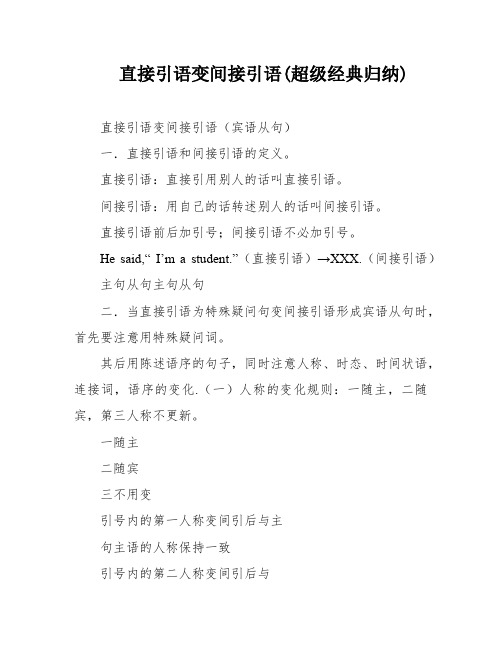宾语从句 直接引语与间接引语中考复习共23页文档
- 格式:ppt
- 大小:3.45 MB
- 文档页数:23



直接引述别人讲过的话叫做直接引语,引述的话通常放在引号内。
人说过的话叫做间接引语,间接引语在多数情况下构成的是宾语从句。
直接引语和间接引语之间可进行转换。
转换时通常注意人称、句式、时态和状语间、地点)方面的变化。
say to通常改为tell(一)人称变化:直接引语变间接引语时,的改变。
Eg. Uncle Lee said,”I will visit you after work.”said that he would visit me after work.变的方式与宾语从句的种类相同。
1、直接引语是陈述句时转换成间接引语即宾语从句时用that替代词引导,Eg Tom said,”My father get home from the park at six o’clock.---->Tomthat his father got home from the park at six o’clock. ”2语从句相同)的语序,同时引导词视情况而定。
(1)直接引语是一般疑问句时,用whether/if 引导,同时注意原句的谓语动词是say时,改成ask。
因为一般疑问句没有明确的肯定或否定结果所以用ask询问。
“Have you seen her somewhere?”her somewhere.(2)直接引语为特殊疑问句变间接引语时,疑问词不变,用疑问词+陈述句结构。
“what are you doing?”,she shouted at me.---->She asked me what I was(3)直接引语是选择问句时,变成间接引语,可用ask或wonder出一个明确的结果,需要询问,所以用whether…or引导。
My father said,”Dolike apples or bananas?”apples or bananas.3、直接引语是祈使句转换成间接引语,要该写成一个to do的形式,即say to sb----eg (命令)tell sb to do sth tell sb not to do sth(请求not to do stheg “Don’t move,Tom”, my mother said .---.>My mother told me not to“Happy new year to you”,Mr Zhang said to me--->Mr Zhang wished me to be4、直接引语如果是以“Let‘s”开头的祈使句,变为间接引语时,+动名词(或从句)。

直接引语和间接引语直接引述别人的原话,叫直接引语。
用自己的话转述别人的话,叫间接引语。
例: “I remember I had seen you.” I said.“What’s you name?” she asked.Mary said she had already seen the film.He replied that he was going by train.将直接引语变为间接引语时要做一些相应的变化, 主要有以下几种情况。
1. 时态的变化一般现在时→一般过去时一般将来时→过去将来时现在进行时→过去进行时一般过去时→过去完成时现在完成时→过去完成时例:He said: “I came to help you.” ” He said that he had come to help me.*直接引语如果是客观真理,变间接引语时,时态不变。
例:He said: “Light travels much faster than sound.”He said that light travels much faster than sound. 2. 时间状语的变化n ow → then last month→ the month before today → that night today → that daythree days ago → three days before tomorrow → the next daythis week → that week next month → the next month yesterday → the day beforethe day after tomorrow→ in two days例:She sai d, “I went there yesterday.” She said that she had gone there the day before.3. 指示代词的变化this → that these → those She said: “I will come this morning.” She said that she would go that morning.4. 地点状语的变化here → thereHe said, “My sister was here three days ago.” He said that his sister had been there three days before.5. 谓语动词的变化come → goShe said, “I will come here tomorrow.”She said that she would go there the next day. 6. 人称的变化直接引语变间接引语相当于把直接引语变为宾语从句。


中考英语复习-直接引语和间接引语语法要点:直接引语和间接引语属于宾语从句范畴。
直接引述别人的原话,叫直接引语;用自己的话转述别人的话,或引用自己说过的话,叫间接引语。
由于时间、地点以及人物都有可能起变化,所以间接引语中的时态、人称、语序、指示代词、时间状语、地点状语等要作相应的变化。
1. 直接引语和间接引语的转换方法①间接引语语序改为陈述句语序陈述句用that 引导,口语中常省略She said,例:“I am going to the cinema. ”→She said (that) she was going to the cinema.②一般疑问句用if/whether连接,例:“Have you ever travelled by plane?”she asked me.→She asked me if / whether I had travelled by plane.③反意疑问句用if/whether连接,例:He asked,“You are a doctor,aren’t you?”→He asked (me) if / whether I was a doctor.④特殊疑问句由原疑问词连接(如疑问代词是主语,不要改变语序),例:He asked, “Who will come to help us?”→He asked who would come to help them.She said, “Where have you been,Simon?”→She asked Simon where he had been.⑤选择疑问句由whether…or 引导,例:Eddie said, “Is this a TV set or a computer?”→Eddie asked (me) whether that was a TV set or a computer.⑥祈使句用“tell /ask /order someone (not) to do something”结构,将动词原形变为动词不定式,例:“Put up your hands,”said the teacher.→The teacher told them to put up their hands.“Don’t play football on the street,”the policeman said.→The policeman ordered us not to play football on the street. 词语辨析1.in front of, in the front ofin front of的意思是“在……前面”?如:There is a tree in front of the house。



直接引语变间接引语(超级经典归纳)直接引语变间接引语(宾语从句)一.直接引语和间接引语的定义。
直接引语:直接引用别人的话叫直接引语。
间接引语:用自己的话转述别人的话叫间接引语。
直接引语前后加引号;间接引语不必加引号。
He said,“ I’m a student.”(直接引语)→XXX.(间接引语)主句从句主句从句二.当直接引语为特殊疑问句变间接引语形成宾语从句时,首先要注意用特殊疑问词。
其后用陈述语序的句子,同时注意人称、时态、时间状语,连接词,语序的变化.(一)人称的变化规则:一随主,二随宾,第三人称不更新。
一随主二随宾三不用变引号内的第一人称变间引后与主句主语的人称保持一致引号内的第二人称变间引后与主句宾语的人称保持一致引号内的第三人称在变间引后去人称稳定He says,”Ilike math very much。
→XXX。
He said to Lily,“you must get。
up early”→He told Lily that。
she must get up。
earlyShe said to me。
“They want to help him”→She told me that。
they wanted。
help him★(二).时态变化宾语从句时态变化规则:主现从不限;主过从四过(即4种过去的时态:一般过去时;过去进行时;过去将来时;过去完成时);客观真理,只用一般现在时。
1.主句普通目前时,从句可用随便时态。
2.主句曩昔时,从句用响应的曩昔时态。
即普通目前时改成普通曩昔时;目前举行时改成曩昔举行时;普通未来时改成曩昔未来时;普通曩昔时、目前完成时、曩昔完成时改成曩昔完成时。
3.主句过去时,从句是客观真理时,只用一般现在时。
XXX us:" XXX."XXX.主句的时态从句的时态例句一般现在时所需的任何时态He says,”XXX。
He says→He says that he likes math very much直接引语间接引语一般现在时一般过去时He said。




直接引语与间接引语专项复习引述别人的话时,一般采用两种方式:一是引用别人的原话,把它放在引号内,称为直接引语;二是用自己的话加以转述,被转述的话不放在引号内,称为间接引语。
间接引语在大多数情况下是一个宾语从语。
直接引语变成间接引语时,要注意以下几点:人称变化、时态变化、宾语从句要用陈述句语序。
1. 直接引语是陈述句变为间接引语的方法如果直接引语是陈述句,在变为间接引语时,由连词that引导(that可省略)。
主句中如果有say to somebody(对某人说),通常变为tell somebody(告诉某人)。
He said, “I get on well with people here.”→He said that he got on well with people there.Susan said, “We can finish the work tomorrow.”→Susan said that they could finish the work the next day.John said to me, “I told her all about it three days ago.”→John told me that he had told her all about it three days before.【注意】如果直接引语是两个并列的陈述句,变为间接引语时,第一个宾语从句前的that有时可省略,但第二个宾语从句前的that不可省略。
He said, “I like swimming and I want to go swimming with you.”→He said (that) he liked swimming and that he wanted to go swimming with us.2. 直接引语是一般疑问句变为间接引语的方法直接引语如果是一般疑问句,变为间接引语时,要用连词whether 或if 引导,同时把原来的疑问句语序变为陈述句语序。

宾语从句1.宾语从句的概念:在复合句中,充当宾语的是个句子,或者说句子作宾语。
2.位置:动宾,介宾3.句子结构:主句+连词(引导词)+宾语从句宾语从句的引导词:一、当宾语从句是陈述句时(包括肯定句和否定句),连词由that引导,因为that在从句中不作任何成分,也没有任何具体意思,因此在口语或非正式文体中常省略。
例:1.LinTaofeels(that)hisownteamisevenbetter.2.Jimthought(that)thetrainwaslikeabigmovingparty.二、在主句为动词be加某些形容词,如sorry,sure,afraid,glad……作表语时(be+a.看作是一个动词词组),后面所跟从句也是宾语从句。
例:1.I’msorry(that)Idon’tknow.2.We’resure(that)ourteamwillwin.注:that在句中无词汇意义,在从句中不能充当成分,在口语当中往往省略。
三、当宾语从句是一般疑问句时,由连词whether或if引导(口语中常用if),if/whether 虽然不作成分,但是译为:“是否”,所以不能省略。
例:1.Lilywantedtoknow(if/whether)hergrandmalikedthehandbag.2.Let’ssee(if/whether)wecanfindoutsomeinformationaboutthatcity.注:1.当句中有or或者ornot时,引导词只能用whether而不能用if.2.在介词后面,引导词只能用whether而不能用if.3.在动词不定式前,引导词只能用whether而不能用if.四、当宾语从句是特殊疑问句时,由连接代词(what,who,whom,which,whose)或连接副词(when,where,why,how,howmany,howold,howlong,……,)引导,每个连接词在从句中都担任一定的句子成分,意思各不相同,所以不可以省略。

直接引语与间接引语1直接引语与间接引语直接引语:用引号原封不动地把某人说的话引述下来间接引语:不用引号转述某人说的话四种不同类型1. 陈述句以“that”引导;例:“Iam a doctor.” he says. ∙He says (that) he is a doctor.2. 一般/反意/选择疑问句以“whether”或“if”引导:例:“Have you finished your work?” he asked me. ∙He asked me if /whether I had finished my work.“Do you like the red one or the blue one?” he asked me.∙He wondered whether I liked the red one or the blue one. (wonder=want to know)3. 特殊疑问句以原疑问词引导;例:“What are you doing?” he asked. ∙ He asked what I was doing.4. 祈使句以不定式作复合宾语(宾语补足语)。
例:“Be careful!” he said to me. ∙ He told me to be careful.“Don’t look out of the door.” mother said to him. ∙ Mother asked/told him not to look out of the door.注意:1.由let开头的祈使句,变间接引语时,选用suggest+动名词或+that引导的宾语从句。
例:“Let's go skating for a while,”he said to me.∙ He suggested our going skating for a while.∙ He suggested that we should go skating for a while.Our teacher said, “Let's go boating together.”∙Our teacher suggested going boating together. ∙Our teacher suggested that we should go boating together.2.“Would you like to…?”和“Would you please…?”表示的是请求,变为间接引语时,常用不定式形式。

精品文档直接引语变间接引语(宾语从句)讲解与练习一.讲解:在复合句中,作宾语的句子(主谓结构)就叫宾语从句。
直接引语变间接引语多数情况下构成宾语从句。
变化时应注意以下几点:1. 引导词(连词)①如果直接引语是陈述句,变成间接引语,引导词用that, that没有实际意义,口语或非正式文体中常省略 e.g He said, My mother is a doctor/' He said (that) his mother was a doctor.②如果直接引语是一般疑问句,变成间接引语,引导词就用ifo不能省略 e.g Are youEnglish?" He asked me^He asked me if I was English.③如果直接引语是特殊疑问句,变成间接引语,引导词就用特殊疑问句的疑问词,女口:whatwhen where which who how 等,这些词有意义,不能省略:eg Aow old are you ? " He asked me^ He asked me how old I was.二•间接引语的宾语从句中,引导词之后都必须使用陈述语序,即“引导词+主语+谓语…),肯定式的宾语从句不用助动词do(did或does) e.g.She asked, What does he want?" -^She asked what he wan ted.He asked me , a Do you like English? ” He asked me if I liked English.三.时态的变化:1. 如果主句中的谓语动词用一般过去时,则间接引语中宾语从句须用过去的某种时态。
基本原则是:往过去的方向推一个时态,即一般现在时变成一般过去时,现在进行时变成过去进行时,一般将来时变成过去将来时eg:①He asked me, " Do you have a diction ary? ” He asked me if I had a diction ary.②She asked, "What is Tom doing? -^She asked what Tom was doing.③She said , "I will leave a message o n his desk." She said that she would leave a message on his desk.2. 如果宾语从句表达的是客观真理,自然现象。